Are you looking for a substitute for whole grain mustard?
Whole grain mustard adds flavor, texture, and tang to dishes, from salads to sandwiches.
Unfortunately, it can be tricky to source – especially if you don’t have access to an international grocery store.
If you’ve been in this exact boat before and are now wondering what else could replace that distinct earthy-mustard flavor of whole grain mustard – worry not!
There are plenty of tasteful alternatives out there that will save the day in a pinch.
What Is Whole Grain Mustard?
Whole grain mustard is a condiment prepared with ground mustard seeds and other ingredients such as vinegar, sugar, salt, spices, and herbs.
It has an earthy flavor ranging from mild to spicy depending on the type of mustard seeds used.
Whole grain mustard can be used in sauces, vinaigrettes, marinades, and as a condiment on sandwiches.
It can also be added to roasted vegetables for extra flavor.
Whole grain mustard is an excellent source of antioxidants, making it a great addition to any healthy diet.
When using whole grain mustard in cooking, remember that the flavors will intensify during the cooking process, so use it sparingly.
You may need to adjust the recipe accordingly if using a milder mustard.
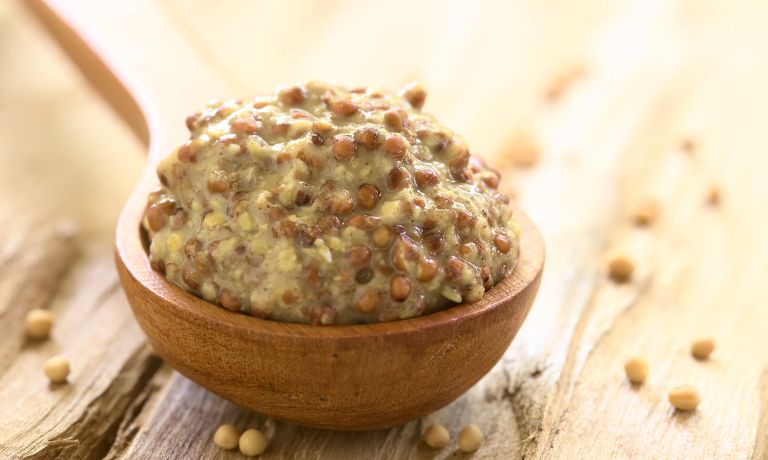
Substitutes For Whole Grain Mustard
For those who don’t have or don’t care for its pungent flavor, there are a few alternatives:
Wasabi
Wasabi is a member of the Brassicaceae family, which includes mustard and horseradish.
It has a strong, pungent flavor, similar to horseradish or mustard, but with a slightly sweeter and more subtle taste.
Wasabi may be used when you want to add a bit of pungent heat without overwhelming other flavors.
It can also be used to top sandwiches or as a marinade for vegetables and meat. It is best used fresh, as the flavor diminishes over time.
Wasabi is commonly sold as a paste, although roots are sometimes available in specialty stores.
When using wasabi as a substitute for mustard, it is best to use a ratio of two parts wasabi paste and one part water.
This will create the perfect balance between the pungent flavor of wasabi and the creamy texture of mustard.
Finally, experiment with different ratios to find what works best for your tastes!

Horseradish
Horseradish is a vegetable from the Brassicaceae family and is closely related to mustard, cabbage, and wasabi.
It has a sharp flavor similar to mustard, with a slightly pungent aroma.
Although horseradish is most commonly used as an ingredient in sauces and condiments like wasabi, it can also be used as a substitute for whole grain mustard in many cooking applications.
Because horseradish has a similar flavor to mustard, it can be used to replace whole grain mustard in dishes like vinaigrette salad dressings and marinades.
It has a slightly more pungent flavor than regular yellow mustard but still works well as a substitute in recipes.
In addition to its flavor benefits, horseradish is packed with vitamins and minerals, including Vitamin C and potassium.
Horseradish is an excellent choice for those looking to add extra flavor to their dishes without sacrificing nutrition.
While it may not be as widely used as regular mustard, it can be a great alternative that adds an extra layer of flavor to any dish.
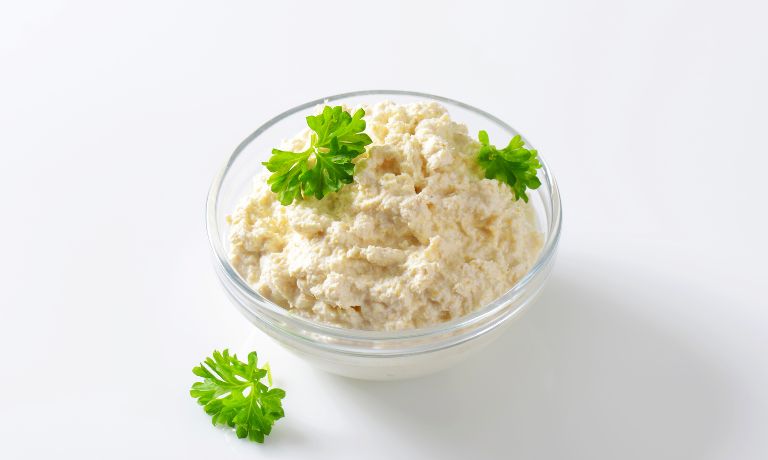
Honey Mustard
Honey Mustard is a condiment made by combining honey, mustard, and usually oil or vinegar.
It is a milder, sweeter version of whole grain mustard and can be used as a tasty recipe alternative.
Honey Mustard has a slightly tangy flavor that gives it an interesting taste that works well with many dishes.
It can be used as a salad dressing or to marinate chicken, pork, and beef. It is also great for dipping sandwiches and vegetables.
Honey Mustard is a substitution for whole grain mustard because it adds sweetness and flavor without overpowering the other ingredients in the dish.
This makes it ideal for people trying to cut down on sodium or those who don’t care for the intense flavor of whole grain mustard.

Yellow Mustard
Yellow Mustard, also known as American mustard and ballpark mustard, is a variety of prepared mustard made from ground yellow seeds.
It is characteristically milder than other types of mustard but still has enough flavor to suit many recipes.
It can generally be used instead of whole grain mustard in cooking, as its milder flavor won’t overpower the other ingredients.
It is also a great choice for adding some zing to sandwiches, hamburgers, hot dogs, and salad dressings and sauces.
If you are looking for an easy way to add flavor to your cooking without overwhelming the taste of other ingredients, yellow mustard may be just what you need.
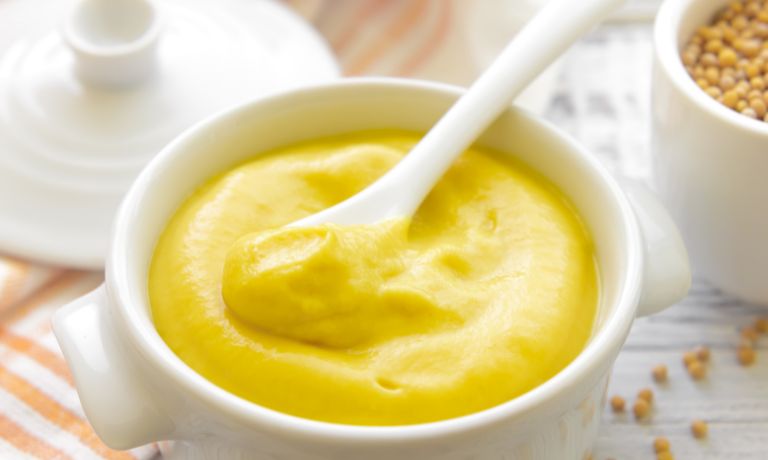
Dijon Mustard
Dijon mustard is a type of mustard that originated in the Burgundy region of France.
It has a smooth, creamy texture and sharp flavor compared to traditional yellow mustard.
Dijon mustard is made with unfermented grape must mix with vinegar, salt, and spices like turmeric or coriander, giving it its characteristic flavor.
It can be used as a condiment on sandwiches, in sauces, dressings and marinades or as an ingredient for dishes like macaroni and cheese, deviled eggs, and potato salad.
Dijon mustard has the same creamy texture and sharp flavor but without the added crunch of whole grain mustard.
It’s also milder than whole grain mustard, making it ideal for those who don’t like too much spice in their dishes.
Dijon mustard is also a great way to add flavor without the calories associated with traditional condiments like mayonnaise or butter.
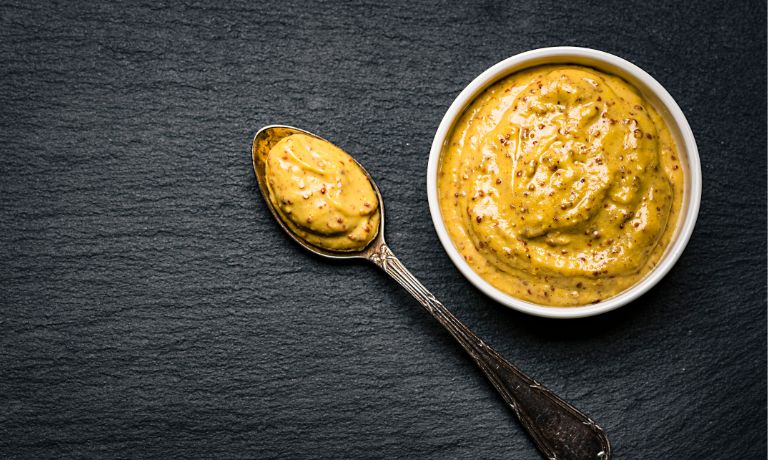
Tarragon Mustard
Tarragon Mustard is a type of mustard that combines the flavor of tarragon, a mild herb with an anise-like flavor, the tang or zing of mustard.
This makes it a great substitute for whole grain mustard in cooking because it has a more mild and more subtle flavor than other mustards.
It can be used in various dishes like sandwiches, salads, sauces, and marinades.
Tarragon Mustard is also a great condiment for adding flavor to grilled meats or vegetables.
Because it is milder than traditional mustard, it can often be added without overwhelming the flavor profile.
It is a versatile product that can be used to add flavor without overpowering the other ingredients.
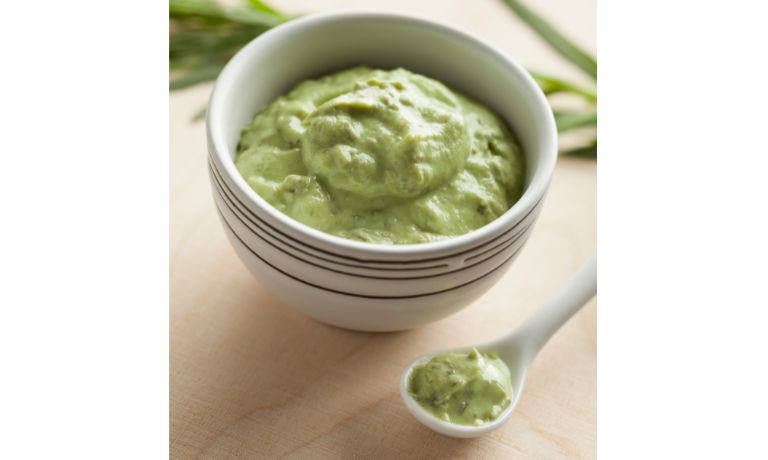
German Mustard
German Mustard is a variety of mustard made with white or yellow mustard seeds and spices such as turmeric, paprika, garlic, clove and allspice.
It has a milder flavor than other mustards and can be used to substitute for whole grain mustard in certain recipes.
Its creamy texture makes it great for salad dressings, sauces, marinades and more.
It is also popular as a condiment for cold meats, hotdogs and sandwiches.
German mustard adds flavor to almost any food without overpowering it, making it a great addition to many dishes.
In addition to its mild flavor, German mustard is also known for its health benefits.
Finally, German mustard is low in fat and calories, making it a great way to add flavor without adding extra calories.
FAQs
Is Whole Grain Mustard Similar To Dijon Mustard?
No, whole grain mustard is not the same as Dijon mustard.
Whole grain mustard is made from whole seeds or ground mustard and vinegar.
Dijon mustard is typically made with white wine, spices, and sometimes honey or other sweeteners.
Is Brown Mustard An Acceptable Substitution For Whole Grain Mustard?
Yes, brown mustard is an acceptable alternative to whole grain mustard.
It is slightly milder in flavor but will still add a pleasant tang to your dish. The two mustards can be used interchangeably in most recipes.
Is It Possible To Substitute Yellow Mustard With Whole Grain Mustard?
Yes, you can substitute yellow mustard with whole grain mustard.
Whole grain mustard has a stronger flavor than yellow mustard and may give your dish a unique kick.
Conclusion
Mustard is an incredibly versatile condiment that can add flavor to just about any dish.
Whether you’re looking for a subtle flavor or something more intense, there is a type of mustard to fit your needs.
Whole grain mustard has a strong and pungent flavor that works well in salad dressings and marinades, while yellow and Dijon mustard have milder flavors better suited for sandwiches and sauces.
Try tarragon or German mustard if you’re looking for something different.
All of these mustards offer their unique flavor profile as well as potential health benefits.
With so many options to substitute for whole grain mustard, you’ll never get bored with mustard again!

